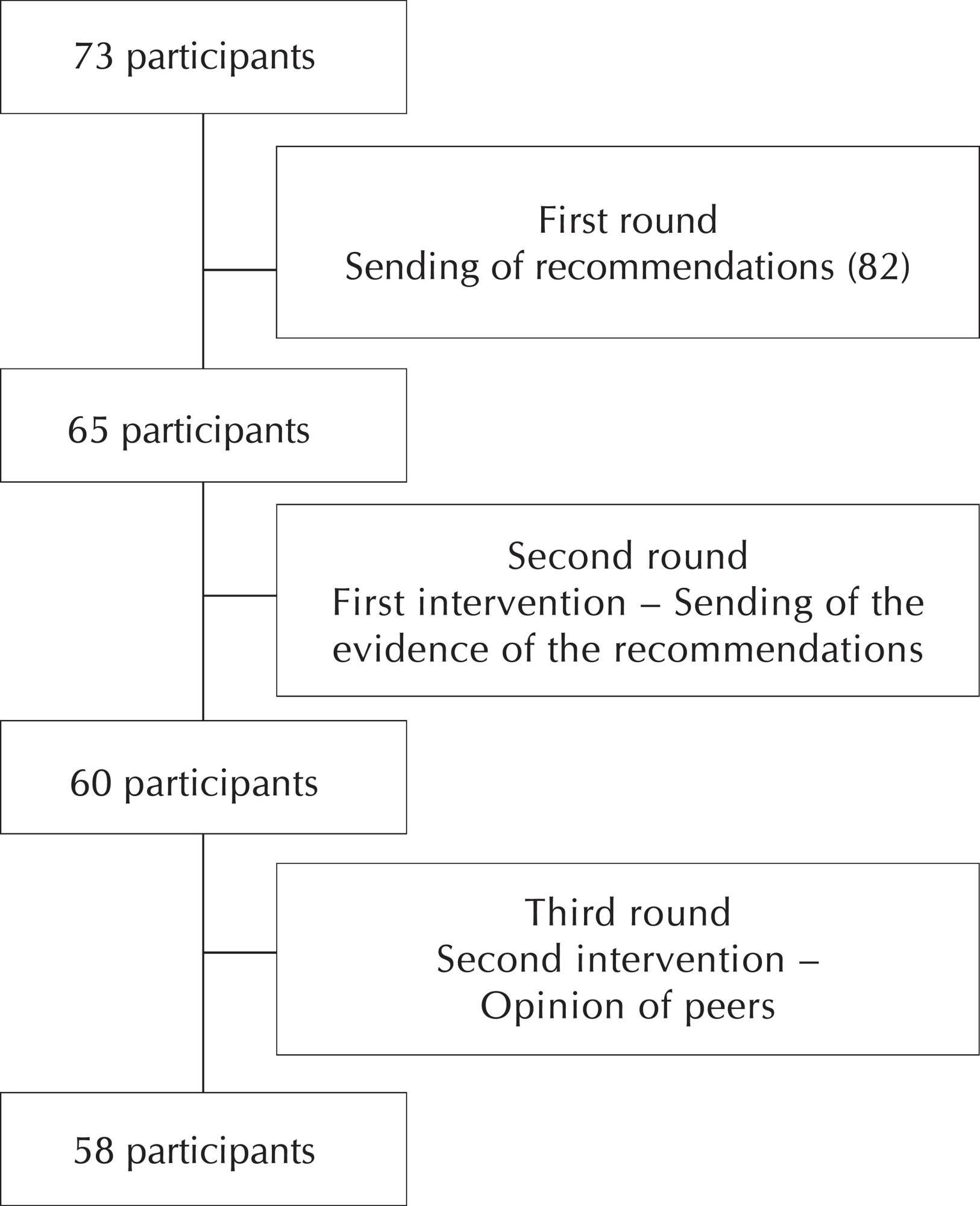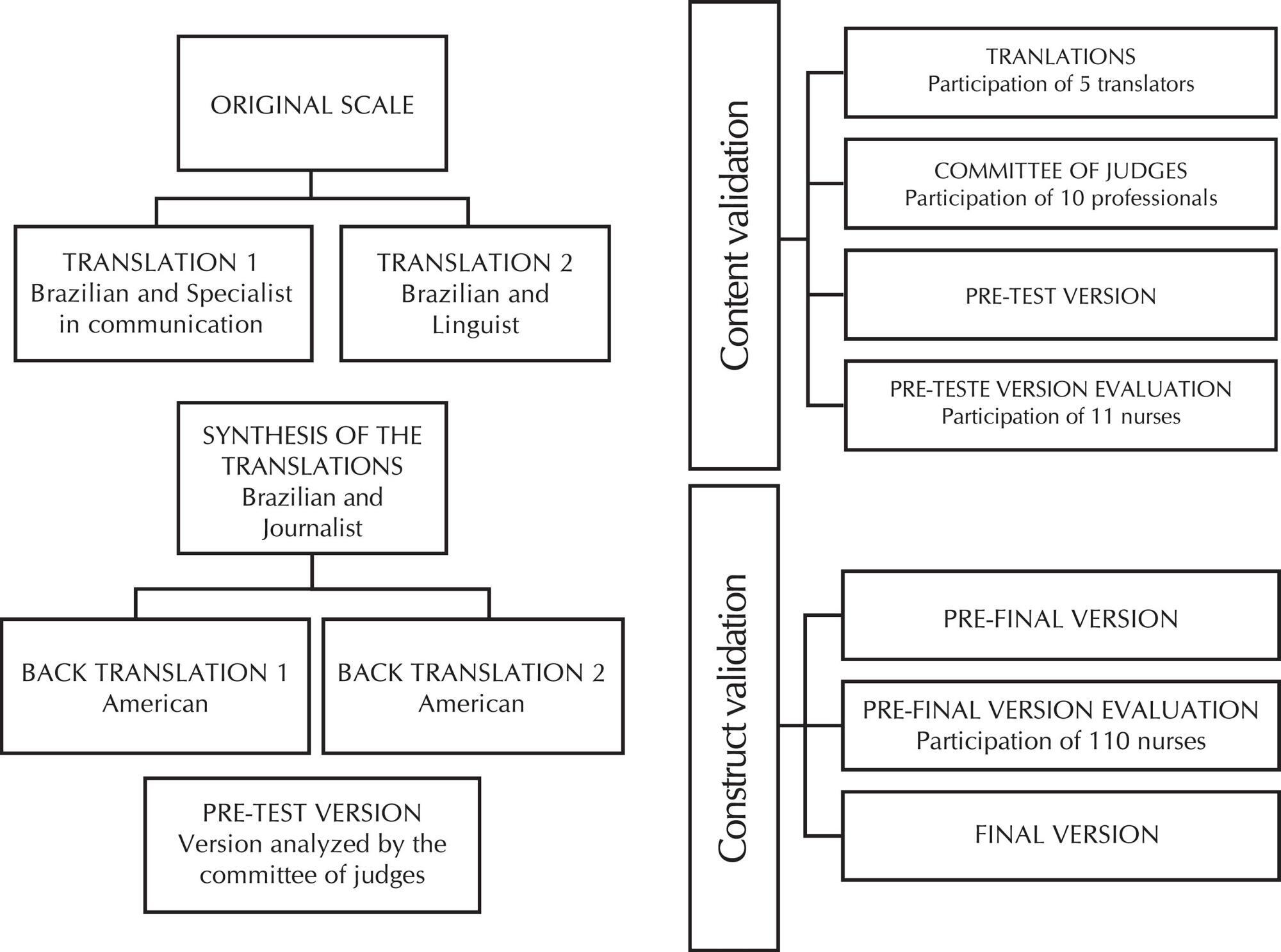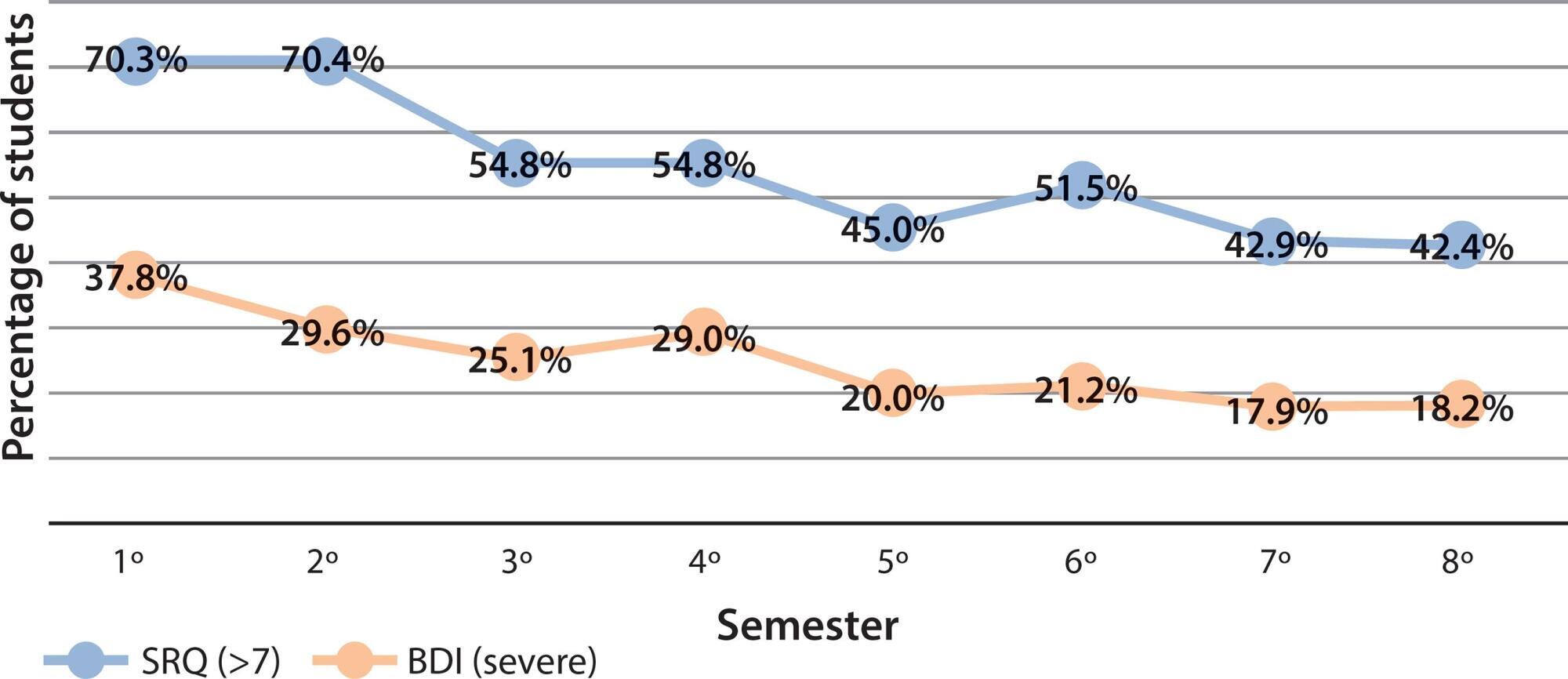-
RESEARCH01-01-2017
Opioid analgesic administration in patients with suspected drug use
Revista Brasileira de Enfermagem. 2017;70(3):626-632
Abstract
RESEARCHOpioid analgesic administration in patients with suspected drug use
Revista Brasileira de Enfermagem. 2017;70(3):626-632
DOI 10.1590/0034-7167-2016-0501
Views0See moreABSTRACT
Objective:
To identify the prevalence of patients suspected of drug use according to the nursing professionals’ judgement, and compare the behavior of these professionals in opioid administration when there is or there is no suspicion that patient is a drug user.
Method:
A cross-sectional study with 507 patients and 199 nursing professionals responsible for administering drugs to these patients. The Chi-Square test, Fisher’s Exact and a significance level of 5% were used for the analyzes.
Results:
The prevalence of suspected patients was 6.7%. The prevalence ratio of administration of opioid analgesics ‘if necessary’ is twice higher among patients suspected of drug use compared to patients not suspected of drug use (p = 0.037).
Conclusion:
The prevalence of patients suspected of drug use was similar to that of studies performed in emergency departments. Patients suspected of drug use receive more opioids than patients not suspected of drug use.

-
RESEARCH01-01-2017
Insulin therapy waste produced in the households of people with diabetes monitored in Primary Care
Revista Brasileira de Enfermagem. 2017;70(3):618-625
Abstract
RESEARCHInsulin therapy waste produced in the households of people with diabetes monitored in Primary Care
Revista Brasileira de Enfermagem. 2017;70(3):618-625
DOI 10.1590/0034-7167-2016-0406
Views0See moreABSTRACT
Objective:
To analyze the insulin therapy waste disposal produced in the households of people with diabetes mellitus (DM).
Method:
Cross-sectional study with 105 Primary Care patients. Socio-demographic and clinical variables and insulin therapy practice were analyzed through the absolute and relative frequencies, Fisher’s exact test and prevalence ratio (PR).
Results:
The association between types of insulin (60.0%), administered with a disposable syringe attached to a needle (80.9%), and a high percentage of reuse and disposal in normal household waste (57.1%) stood out. The professionals who most frequently provided guidance to people with diabetes were the nurses. Patients who had received instructions about disposal were 21 times more likely to dispose of waste properly than those who had not (PR 21.5; P < 0.0001). Age, gender, skin color, education, marital status, occupational status and type of DM did not interfere in the disposal (P > 0.05).
-
RESEARCH01-01-2017
Use of the Diffusion of Innovation Model in venous ulcers by specialized professionals
Revista Brasileira de Enfermagem. 2017;70(3):610-617
Abstract
RESEARCHUse of the Diffusion of Innovation Model in venous ulcers by specialized professionals
Revista Brasileira de Enfermagem. 2017;70(3):610-617
DOI 10.1590/0034-7167-2016-0235
Views0ABSTRACT
Objective:
To analyze the influence of the evidence and of the opinion of peers on the decisions of specialists regarding the agreement with recommendations for prevention and treatment of venous ulcer.
Methods:
This is a quasi-experimental study with two interventions: provision of studies with the evidence of the recommendations and provision of the opinion of peers, with sample of 73 specialized doctors and nurses. Delphi technique was used in the search for agreement, with three rounds.
Results:
The participants evaluated 82 recommendations organized into eight domains: evaluation of patient and wound; documentation of clinical findings; care with the wound and surrounding skin; indication of dressing; use of antibiotics; improvement of venous return and prevention of recurrence; referrals of patients; and professional training. The interventions resulted in statistically significant changes in four domains.
Conclusion:
The interventions were able to change the opinion of participants, leading them to agreement regarding the recommendations, regardless of the level of evidence.
Keywords:Delphi TechniqueDiffusion of InnovationHealth PersonnelPractice Guidelines as TopicVaricose UlcerSee more
-
RESEARCH01-01-2017
Teaching-learning evaluation on the ICNP® using virtual learning environment
Revista Brasileira de Enfermagem. 2017;70(3):602-609
Abstract
RESEARCHTeaching-learning evaluation on the ICNP® using virtual learning environment
Revista Brasileira de Enfermagem. 2017;70(3):602-609
DOI 10.1590/0034-7167-2016-0545
Views0ABSTRACT
Objective:
Evaluating the teaching-learning process of undergraduates and nursing professionals on the International Classification for Nursing Practice (ICNP®) through a course on Moodle Platform.
Method:
Mixed research conducted with 51 nursing students and nurses. Many technological and educational resources were used. To collect data, two semi-structured questionnaires were applied and focus groups were carried out. Statistical and thematic analysis of the data was performed.
Results:
There was a correlation between the Wiki variable, the Animation Video (p = 0.002) and the Arch Method (p = 0.04), as well as a correlation between the Forum, the Virtual Book (P < 0.001) and time (p = 0.009). Three topics emerged: innovation in the application of technological resources, distance education in the professional education and permanent education and the teaching-learning process on the ICNP® in a collaborative way.
Conclusion:
Teaching-learning strategies and technological resources used were pointed out as innovative and helped students have a better performance.
Keywords:Education, ContinuingEducation, DistanceEducation, NursingEducational TechnologyNursing CareSee more -
RESEARCH01-01-2017
Use of technologies in intravenous therapy: contributions to a safer practice
Revista Brasileira de Enfermagem. 2017;70(3):595-601
Abstract
RESEARCHUse of technologies in intravenous therapy: contributions to a safer practice
Revista Brasileira de Enfermagem. 2017;70(3):595-601
DOI 10.1590/0034-7167-2016-0216
Views0See moreABSTRACT
Objectives:
To identify what are the difficulties of the nursing staff in the management of technologies during intravenous therapy (IVT) and discuss the difficulties identified under the perspective of patient’s safety.
Method:
Descriptive study of qualitative approach with data collected by semi-structured interview and analyzed by the Alceste software.
Results:
The greatest difficulty of cognitive and technical emphasis was the lack of training; and regarding administrative emphasis, the greatest difficulty was the lack of material and human resources. Infusion pumps and their proper use were highlighted as the technological resource that most contributed to patient safety.
Final considerations:
The lack of training is presented as the greatest difficulty of nursing professionals and permeates safety issues of both patient and professional when using the hard technologies in IVT. Training is essential to the development of techniques, considered nursing tools.
-
RESEARCH01-01-2017
Validation of the self-assessment of communication skills and professionalism for nurses
Revista Brasileira de Enfermagem. 2017;70(3):588-594
Abstract
RESEARCHValidation of the self-assessment of communication skills and professionalism for nurses
Revista Brasileira de Enfermagem. 2017;70(3):588-594
DOI 10.1590/0034-7167-2016-0133
Views0ABSTRACT
Objectives:
to translate, adapt cross-culturally and validate into Brazilian Portuguese the following instrument: “Self-assessment of communication skills and professionalism in residents” for the nursing professional, and to determine if personal characteristics and performance of the nurse interfere in the self-assessment about professionalism and interpersonal communication.
Method:
quantitative study.
Results:
the sample consisted of 110 nurses with mean age of 32 years old (± 7.3), most of them were women (n = 80; 72.7%). The internal consistency of the scale “Autoavaliação sobre profissionalismo e comunicação interpessoal entre enfermeiro e paciente” presented moderate and satisfactory reliability (α=0,712). Factorial analysis identified four factors: Interpersonal Skills, Exchange of Information, Honesty in the Relationship and Professionalism.
Conclusion:
the instrument is valid and reliable in Portuguese and for Brazilian culture. Interpersonal Skills changed with gender and marital status. Ability to exchange information was influenced by gender and working sector. Self-assessment of professionalism changed with marital status.
Keywords:CommunicationNonverbal CommunicationNurse-patient RelationshipSelf-AssessmentValidity StudiesSee more
-
RESEARCH01-01-2017
Power relations in the family health team: focus on nursing
Revista Brasileira de Enfermagem. 2017;70(3):580-587
Abstract
RESEARCHPower relations in the family health team: focus on nursing
Revista Brasileira de Enfermagem. 2017;70(3):580-587
DOI 10.1590/0034-7167-2015-0171
Views0See moreABSTRACT
Objective:
to analyze the power relations that permeate the work of the family health team, and to discuss perspectives of emancipation of these subjects, focusing on nursing and community health agents.
Method:
a qualitative study with a family health team from a municipality in the countryside of the state of São Paulo. Data were collected through systematic observation and interview with workers. A thematic content analysis was performed.
Results:
three categories were identified: the work of the family health team and power relations; power relations between the nurse and the healthcare team; and the relations among the nursing team and between community agents and the nurse. The team produces relations of power moved by hierarchical knowledge that move in the search for the reordering of powers.
Final considerations:
it is necessary to review the contradictions present in the performance scenario of the family health teams, with a view toward making power relations more flexible.
-
RESEARCH01-01-2017
Virtual learning object and environment: a concept analysis
Revista Brasileira de Enfermagem. 2017;70(3):572-579
Abstract
RESEARCHVirtual learning object and environment: a concept analysis
Revista Brasileira de Enfermagem. 2017;70(3):572-579
DOI 10.1590/0034-7167-2016-0123
Views0See moreABSTRACT
Objective:
To analyze the concept of virtual learning object and environment according to Rodgers’ evolutionary perspective.
Method:
Descriptive study with a mixed approach, based on the stages proposed by Rodgers in his concept analysis method. Data collection occurred in August 2015 with the search of dissertations and theses in the Bank of Theses of the Coordination for the Improvement of Higher Education Personnel. Quantitative data were analyzed based on simple descriptive statistics and the concepts through lexicographic analysis with support of the IRAMUTEQ software.
Results:
The sample was made up of 161 studies. The concept of “virtual learning environment” was presented in 99 (61.5%) studies, whereas the concept of “virtual learning object” was presented in only 15 (9.3%) studies.
Conclusion:
A virtual learning environment includes several and different types of virtual learning objects in a common pedagogical context.

-
ORIGINAL ARTICLE07-10-2020
Quality of life, depressive and minor psychiatrics symptoms in nursing students
Revista Brasileira de Enfermagem. 2020;73:e20190134
Abstract
ORIGINAL ARTICLEQuality of life, depressive and minor psychiatrics symptoms in nursing students
Revista Brasileira de Enfermagem. 2020;73:e20190134
DOI 10.1590/0034-7167-2019-0134
Views0See moreABSTRACT
Objective:
To assess quality of life, prevalence of depressive and minor psychiatric symptoms in Nursing students.
Methods:
Cross-sectional study, conducted from March to April 2018, at a federal university. Sample composed of 242 Nursing students, from the 1st to the 8th semester. Data was collected using the quality of life instruments, Beck Depression Inventory and Self-Report Questionnaire. A significance level of 0.05 was considered.
Results:
The mean age was 22.9 ± 5.1 years. It was found that 25% of the students had severe depressive symptoms and 54% of the students had minor psychiatric disorders, with a higher prevalence in the first semesters. An inverse relationship was observed between the frequency of depressive symptoms and quality of life scores (p = 0.05).
Conclusion:
Nursing students showed a high prevalence of depressive symptoms, indicating the importance of implementing actions to promote and prevent mental health.

-
ORIGINAL ARTICLE08-07-2020
Permanent education and matrix support in primary health care: family health routine
Revista Brasileira de Enfermagem. 2020;73(6):e20190076
Abstract
ORIGINAL ARTICLEPermanent education and matrix support in primary health care: family health routine
Revista Brasileira de Enfermagem. 2020;73(6):e20190076
DOI 10.1590/0034-7167-2019-0076
Views0See moreABSTRACT
Objective:
To analyze the understanding of the professionals working on the Family Health Support by about permanent education and matrix support in the daily routine of primary health care.
Methods:
Descriptive research with a qualitative approach. Data were collected through semi-structured interviews with the participation of 19 professionals from different backgrounds. The results were organized based on Thematic Content Analysis.
Results:
Thematic categories emerged from the analysis: Permanent Health Education: knowledge and daily activities; Matrix support as a premise of Permanent Health Education; The principle of integrality as the foundation of the supporting teams; Conditions of praxis in the promotion of Permanent Health Education.
Final Considerations:
The study evidenced that professionals experience their routines within the service and that the sharing of knowledge to transform the reality of users and the territory is based on matrix support and integrality. However, they face structural difficulties in carrying out actions.
-
ORIGINAL ARTICLE10-01-2022
Frailty in the elderly: screening possibilities in Primary Health Care
Revista Brasileira de Enfermagem. 2022;75(2):e20200973
Abstract
ORIGINAL ARTICLEFrailty in the elderly: screening possibilities in Primary Health Care
Revista Brasileira de Enfermagem. 2022;75(2):e20200973
DOI 10.1590/0034-7167-2020-0973
Views0See moreABSTRACT
Objectives:
to evaluate two instruments for screening frailty in the elderly in Primary Health Care.
Methods:
this is an observational, cross-sectional study, with a quantitative approach, with 396 elderly people. SPSS software helped to perform the statistical analyses. The study used the kappa coefficient and Spearman’s correlation.
Results:
the kappa coefficient between the Clinical-Functional Vulnerability Index 20 and the Edmonton Frailty Scale was 0.496, considered moderate. There was a positive and significant correlation (r = 0.77; p < 0.001) between the frailty conditions and the total score of the two instruments.
Conclusions:
when this article assessed fragility through the kappa coefficient, both instruments presented positive correlation and agreement. However, the identification of frailty was higher when it used the Edmonton Frailty Scale.
-
ORIGINAL ARTICLE10-21-2019
Inclusion of mental health in primary health care: care strategy in the territory
Revista Brasileira de Enfermagem. 2019;72(6):1677-1682
Abstract
ORIGINAL ARTICLEInclusion of mental health in primary health care: care strategy in the territory
Revista Brasileira de Enfermagem. 2019;72(6):1677-1682
DOI 10.1590/0034-7167-2018-0806
Views0See moreABSTRACT
Objective:
To analyze the strategies, challenges and possibilities of the articulation between mental health and primary health care from the perspective of health managers.
Method:
Exploratory, qualitative research carried out with 28 managers of mental health and primary care. The data were collected through semi-structured interviews between July and November 2013 and submitted to thematic content analysis.
Results:
The inclusion of mental health actions in primary care made it possible, in the view of managers, to increase users’ access to the care they need. This care strategy allows the extension of care practices in the territory, with matrix support as the main tool for the implementation of this care strategy.
Final considerations:
The articulation between primary care and mental health is a powerful device for psychosocial care, but it demands a new conformation of the Psychosocial Care Centers (Caps) and primary care services.
-
ORIGINAL ARTICLE12-05-2019
Evaluation of delirium in aged patients assisted at emergency hospital service
Revista Brasileira de Enfermagem. 2019;72:153-160
Abstract
ORIGINAL ARTICLEEvaluation of delirium in aged patients assisted at emergency hospital service
Revista Brasileira de Enfermagem. 2019;72:153-160
DOI 10.1590/0034-7167-2018-0386
Views0See moreABSTRACT
Objective:
identify the occurrence of delirium in aged patients assisted in emergency services and verify its relationship with sociodemographic and clinical variables.
Method:
cross-sectional, prospective study with a quantitative approach. Two hundred aged hospitalized patients participated. The Confusion Assessment Method was used for data collection. For statistical analysis, chi-square tests, likelihood ratio and Fisher’s test were used, with a significance level of 5%.
Results:
male gender and mean age of 71.8 years were predominant. In the first 24 hours of hospitalization, 56 (28%) aged individuals presented delirium. An association of the disease with lack of physical activity, presence of a caregiver, hypertension, dyslipidemia and cerebrovascular diseases was identified.
Conclusion:
Delirium was associated with no physical activity, the need of a caregiver, and the presence of comorbidities. The importance of conducting other studies that may lead to early identification of the condition to prevent its complications is emphasized.
-
ORIGINAL ARTICLE10-28-2020
Conflict management strategies used by Portuguese nurse managers
Revista Brasileira de Enfermagem. 2020;73:e20190336
Abstract
ORIGINAL ARTICLEConflict management strategies used by Portuguese nurse managers
Revista Brasileira de Enfermagem. 2020;73:e20190336
DOI 10.1590/0034-7167-2019-0336
Views0See moreABSTRACT
Objectives:
to analyze the perception and conflict management strategies used by nurses in the management of people in Portuguese health services.
Methods:
descriptive, correlational study, carried out in Portuguese health services, with an intentional non-probabilistic sample, totaling 95 nurse managers. A questionnaire and Conflict Management Scale were used, analyzing the variables of managerial activities and conflict management, with the aid of software.
Results:
it was identified that 60% of the managers, report having to mediate conflicts daily, and the majority report adopting dialogue in conduct. However, through the Kruskal-Wallis test, it was shown that enforcement strategies in conflict management prevail (p = 0.008), with collaborative ones being more restricted to monthly intervals (p = 0.049).
Conclusions:
managers perceive the importance of collaboration in the mediation of conflicts, however, in their daily lives; they tend to maintain imposing behaviors, signaling for a little transformational leadership style.

-
EDITORIAL03-15-2021
Advanced Practice Nursing in Latin America and the Caribbean: seeking its implementation
Revista Brasileira de Enfermagem. 2021;74:e74suppl601
Abstract
EDITORIALAdvanced Practice Nursing in Latin America and the Caribbean: seeking its implementation
Revista Brasileira de Enfermagem. 2021;74:e74suppl601
DOI 10.1590/0034-7167.202174suppl601
Views0Healthcare organizations are increasingly complex and specialized, seeking to optimize their quality and safety standards, and be able to meet the growing needs of their users. To face this reality, health professionals need to adapt to respond in time to the demands of the health context. In turn, the World Health Organization (WHO), through the […]See more
Search
Search in:
Nuvem de Tags
Aged (144) Atenção Primária à Saúde (239) COVID-19 (104) Cuidados de Enfermagem (269) Educação em Enfermagem (151) Educação em Saúde (139) Enfermagem (930) Estudos de Validação (131) Health Education (144) Idoso (208) Mental Health (149) Nursing (987) Nursing Care (306) Patient Safety (151) Primary Health Care (284) Qualidade de Vida (104) Quality of Life (106) Saúde Mental (145) Segurança do Paciente (150) Validation Studies (108)



